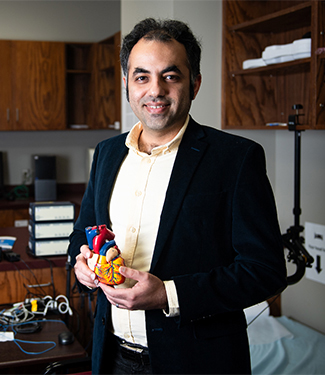Taebi wins NSF CAREER award to improve detection of critical congenital heart defects in newborns

Amirtaha Taebi
Could improved screening methods for detecting newborn heart defects save more lives? That’s what Mississippi State’s Amirtaha Taebi is using a $3 million National Science Foundation award -- and personal motivation -- to find out.
Taebi, an assistant professor in MSU’s Department of Agricultural and Biological Engineering, is the recipient of a National Science Foundation CAREER Award for his work in developing novel screening methods for congenital heart diseases currently missed by standard pulse oximetry tests. Motivated by his family history of heart conditions, Taebi hopes his research can help diagnose life-threatening conditions earlier and save more infants.
“Around 40,000 newborns per year in the U.S. are born with congenital heart defects, and 20% of those have critical defects that can be fatal if not diagnosed early,” Taebi said. “Often, by the time parents realize something is wrong and bring their newborn back to the hospital, it’s too late.”
Taebi’s diverse educational background, which includes degrees from Iran, Italy and the U.S., provides unique perspective and led him from mechanical engineering to the biomedical field. Through collaborations with hospitals and physicians, Taebi hopes to advance screening earlier in at-risk newborns, reducing infant mortality rates.
The current screening method of pulse oximetry can miss certain defects that don’t affect blood oxygen levels and is also less accurate for newborns with darker skin tones. Taebi said this project aims to effectively detect defects using sensors to measure cardiovascular-induced vibrations on the chest surface. The hypothesis is that vibrations will differ for newborns with certain heart defects compared to healthy infants, allowing for earlier diagnosis and treatment.
“Dr. Taebi’s research is truly novel and can lead to new, non-invasive and inexpensive diagnostic techniques for cardiovascular issues,” said Alex Thomasson, professor and department head. “We in the Department of Agricultural and Biological Engineering are very proud of him and his work and excited to see the progress of his research.”
Taebi said he is grateful to have won the award.
“I wasn’t planning to apply this early in my career, but Dr. Katie Echols from the Office of Research and Economic Development encouraged me to apply in my second year,” he said. “Winning it this early is confirmation that I’m on the right track, and I’m grateful for her encouragement.”
The National Science Foundation’s Faculty Early Career Development (CAREER) Program is one of the highest honors bestowed by the NSF in support of junior faculty members who exemplify the role of teacher-scholars through outstanding research, excellent education and the integration of education and research within the context of their organizations’ missions.
Taebi said the annual $600,000 award will allow him to support a postdoctoral researcher for the next two years and develop algorithms to analyze chest vibration data. He also will be able to fund a Ph.D. student to work on this project over the next five years.
CAREER award recipients receive five years of funding for their research endeavors. Taebi joins the list of several Bagley College of Engineering faculty members who have earned the award. Recent recipients include Bo Tang, Jean Mohammadi-Aragh, Ali Gurbuz, Wenmeng “Meg” Tian, Neeraj Rai, Mehmet Kurum, Tanmay Bhowmik, Maxwell Young and Adam Jones.
The Department of Agricultural and Biological Engineering is online at www.abe.msstate.edu. The Bagley College of Engineering is online at www.bagley.msstate.edu and can be found on Facebook, Twitter, Instagram and YouTube at @msuengineering.
Mississippi State University is taking care of what matters. Learn more at www.msstate.edu.
Camille Carskadon | Bagley College of Engineering



